Deck 7: Probability
Question
Question
Question
Question
Question
Question
Question
Question
Question
Question
Question
Question
Question
Question
Question
Question
Question
Question
Question
Question
Question
Question
Question
Question
Question
Question
Question
Question
Question
Question
Question
Question
Question
Question
Question
Question
Question
Question
Question
Question
Question
Question
Question
Question
Question
Question
Question
Question
Question
Question
Question
Question
Question
Question
Question
Question
Question
Question
Question
Question
Question
Question
Question
Question
Question
Question
Question
Question

Unlock Deck
Sign up to unlock the cards in this deck!
Unlock Deck
Unlock Deck
1/68
Play
Full screen (f)
Deck 7: Probability
1
The density function f(x) shown below describes the probability that a computer circuit board will cost a manufacturer more than a certain number of dollars to produce. In this case, the cost of the circuit board, x, is measured in thousands of dollars. Find the height of the triangle that describes the probability density function. 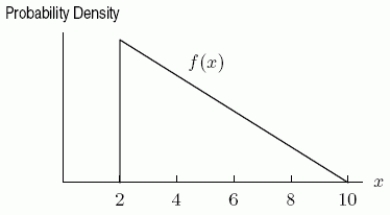

0.25
2
A density function for the age of people enrolled in a class is given in the following figure.
A. Find the value of c.
B. What percent of the class is over 20 years old? Round to the nearest whole percent.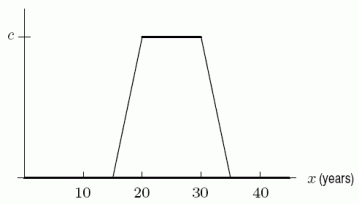
A. Find the value of c.
B. What percent of the class is over 20 years old? Round to the nearest whole percent.

A. 1/15
B. 83%
B. 83%
3
The distribution of heights, x, in meters, of a group of shrubs is represented by the density function  (no shrubs are higher than 1.5 meters). Calculate the percentage of shrubs which are between 1 and 1.5 meter(s) high.
(no shrubs are higher than 1.5 meters). Calculate the percentage of shrubs which are between 1 and 1.5 meter(s) high. 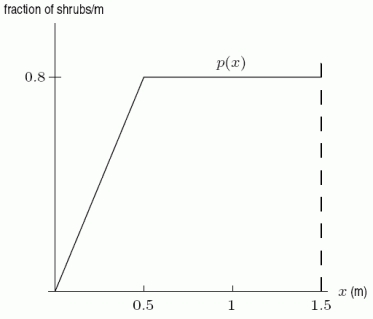
 (no shrubs are higher than 1.5 meters). Calculate the percentage of shrubs which are between 1 and 1.5 meter(s) high.
(no shrubs are higher than 1.5 meters). Calculate the percentage of shrubs which are between 1 and 1.5 meter(s) high. 
40%
4
The following figure gives the density function for the velocities of cars passing a checkpoint on a freeway. What percent of the cars drove less than 60 mph? 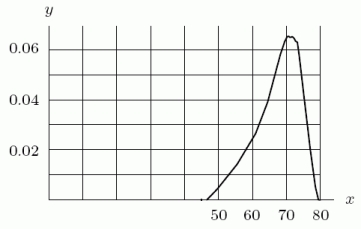
A)5%
B)15%
C)25%
D)35%

A)5%
B)15%
C)25%
D)35%

Unlock Deck
Unlock for access to all 68 flashcards in this deck.
Unlock Deck
k this deck
5
Which of the following could possibly be density functions? Select all that apply.
A) for
for 
B) for
for 
C) for
for 
A)
 for
for 
B)
 for
for 
C)
 for
for 

Unlock Deck
Unlock for access to all 68 flashcards in this deck.
Unlock Deck
k this deck
6
The following figure gives the density function for the velocities of cars passing a checkpoint on a freeway.Which were cars more likely to be driving? 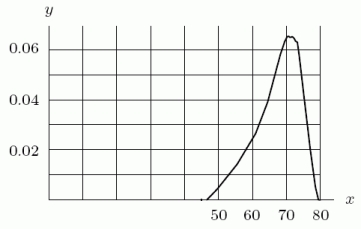
A)Between 55 and 65 mph
B)Between 70 and 80 mph

A)Between 55 and 65 mph
B)Between 70 and 80 mph

Unlock Deck
Unlock for access to all 68 flashcards in this deck.
Unlock Deck
k this deck
7
Suppose that the distribution of people's ages in the United States is essentially constant, or uniform, from age 0 to age 60, and from there it decreases linearly until age 100. This distribution p(x) is shown below, where x is age in years, and p measures probability density. Such a probability distribution is called trapezoidal. 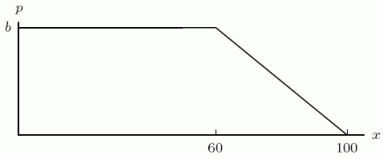 In terms of b (see the graph), find the fraction of the population that is between 60 and 100 years old.
In terms of b (see the graph), find the fraction of the population that is between 60 and 100 years old.
A)60b
B)20b
C)40b
D)80b
 In terms of b (see the graph), find the fraction of the population that is between 60 and 100 years old.
In terms of b (see the graph), find the fraction of the population that is between 60 and 100 years old.A)60b
B)20b
C)40b
D)80b

Unlock Deck
Unlock for access to all 68 flashcards in this deck.
Unlock Deck
k this deck
8
An aptitude test is given to a group of students. Scores can range from 0 to 50. Does the cumulative distribution function in the second graph correspond to the density function in the first graph? Answer "yes" or "no" 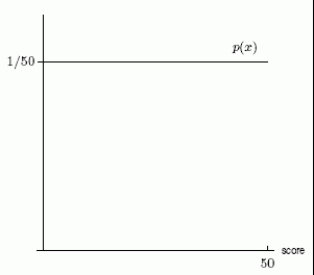
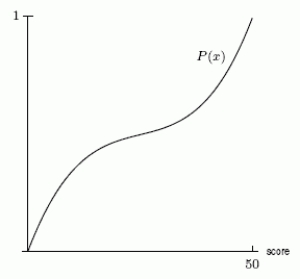



Unlock Deck
Unlock for access to all 68 flashcards in this deck.
Unlock Deck
k this deck
9
A professor far away from here gives the same 100-point final exam year after year and discovers that the students' scores tend to follow the triangular probability density function f(x) pictured below:  Find the value of the height h of the triangular probability density function.
Find the value of the height h of the triangular probability density function.
 Find the value of the height h of the triangular probability density function.
Find the value of the height h of the triangular probability density function.
Unlock Deck
Unlock for access to all 68 flashcards in this deck.
Unlock Deck
k this deck
10
The following figure gives the density function for the number of hours students spent studying for a calculus exam. What is the largest amount of time a student spent studying? 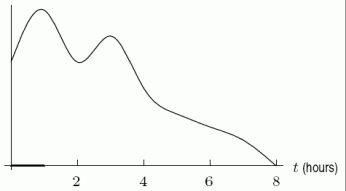
A)1 hour
B)3 hours
C)4 hours
D)6 hours
E)8 hours

A)1 hour
B)3 hours
C)4 hours
D)6 hours
E)8 hours

Unlock Deck
Unlock for access to all 68 flashcards in this deck.
Unlock Deck
k this deck
11
Suppose  is a density function for a certain distribution and
is a density function for a certain distribution and  is the cumulative distribution function for the same distribution. Which of the following gives the fraction of the distribution between x = 7 and x = 16? Select all that apply.
is the cumulative distribution function for the same distribution. Which of the following gives the fraction of the distribution between x = 7 and x = 16? Select all that apply.
A)
B)
C)
D)
 is a density function for a certain distribution and
is a density function for a certain distribution and  is the cumulative distribution function for the same distribution. Which of the following gives the fraction of the distribution between x = 7 and x = 16? Select all that apply.
is the cumulative distribution function for the same distribution. Which of the following gives the fraction of the distribution between x = 7 and x = 16? Select all that apply.A)

B)

C)

D)


Unlock Deck
Unlock for access to all 68 flashcards in this deck.
Unlock Deck
k this deck
12
The density function f(x) shown below describes the probability that a computer circuit board will cost a manufacturer more than a certain number of dollars to produce. In this case, the cost of the circuit board, x, is measured in thousands of dollars. What is the probability that the circuit board will cost less than $2 thousand to produce? 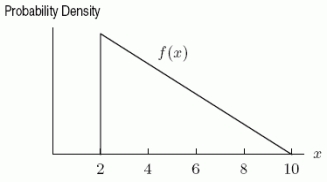


Unlock Deck
Unlock for access to all 68 flashcards in this deck.
Unlock Deck
k this deck
13
A density function for the daily calorie intake of a certain species is given in the following figure.
A. Find the value of c.
B. What percent have daily calorie intake between 30 and 40?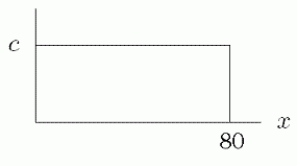
A. Find the value of c.
B. What percent have daily calorie intake between 30 and 40?


Unlock Deck
Unlock for access to all 68 flashcards in this deck.
Unlock Deck
k this deck
14
A density function for the lifetime of a certain type of frog is shown in the following figure. Which is the frog's lifetime more likely to be between? 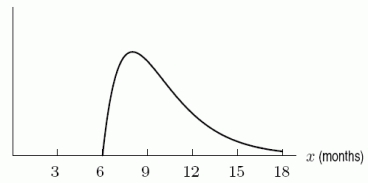
A)7 and 8 months
B)10 and 11 months
C)13 and 14 months

A)7 and 8 months
B)10 and 11 months
C)13 and 14 months

Unlock Deck
Unlock for access to all 68 flashcards in this deck.
Unlock Deck
k this deck
15
The cumulative distribution function in the second graph corresponds to the density function in the first graph. 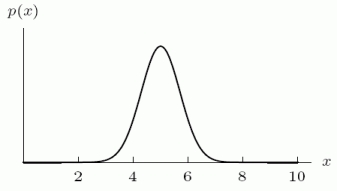
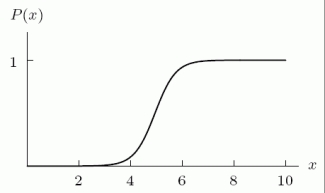



Unlock Deck
Unlock for access to all 68 flashcards in this deck.
Unlock Deck
k this deck
16
A professor far away from here gives the same 100-point final exam year after year and discovers that the students' scores tend to follow the triangular probability density function f(x) pictured below:  What percent of the students would you expect to score below 25 points on the exam?
What percent of the students would you expect to score below 25 points on the exam?
 What percent of the students would you expect to score below 25 points on the exam?
What percent of the students would you expect to score below 25 points on the exam?
Unlock Deck
Unlock for access to all 68 flashcards in this deck.
Unlock Deck
k this deck
17
Suppose  is the cumulative distribution function for sizes of graduating classes among a group of high schools and
is the cumulative distribution function for sizes of graduating classes among a group of high schools and  . Which of the following are possible statements about
. Which of the following are possible statements about  ?
?
A)
B)
C)
 is the cumulative distribution function for sizes of graduating classes among a group of high schools and
is the cumulative distribution function for sizes of graduating classes among a group of high schools and  . Which of the following are possible statements about
. Which of the following are possible statements about  ?
?A)

B)

C)


Unlock Deck
Unlock for access to all 68 flashcards in this deck.
Unlock Deck
k this deck
18
Suppose that the distribution of people's ages in the United States is essentially constant, or uniform, from age 0 to age 60, and from there it decreases linearly until age 100. This distribution p(x) is shown below, where x is age in years, and p measures probability density. Such a probability distribution is called trapezoidal. 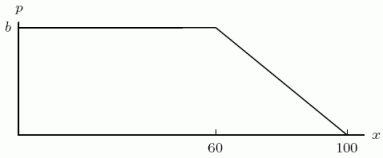 According to this simplified model of the distribution of people's ages in the United States, what percentage of the population is between 0 and 100 years old?
According to this simplified model of the distribution of people's ages in the United States, what percentage of the population is between 0 and 100 years old?
 According to this simplified model of the distribution of people's ages in the United States, what percentage of the population is between 0 and 100 years old?
According to this simplified model of the distribution of people's ages in the United States, what percentage of the population is between 0 and 100 years old?
Unlock Deck
Unlock for access to all 68 flashcards in this deck.
Unlock Deck
k this deck
19
The following figure gives the density function for the number of hours students spent studying for a calculus exam. Did a greater number of students study more than 2 hours or less than 2 hours? Answer "more" or "less". 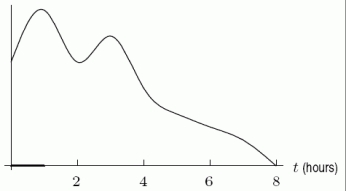


Unlock Deck
Unlock for access to all 68 flashcards in this deck.
Unlock Deck
k this deck
20
The density function f(x) shown below describes the probability that a computer circuit board will cost a manufacturer more than a certain number of dollars to produce. In this case, the cost of the circuit board, x, is measured in thousands of dollars. Which of the following definite integrals give the probability that the circuit board will cost between $2 thousand and some amount $b thousand? Assume that b is between 2 and 10. 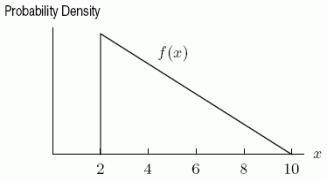
A)
B)
C)
D)

A)

B)

C)

D)


Unlock Deck
Unlock for access to all 68 flashcards in this deck.
Unlock Deck
k this deck
21
The probability of waiting no more than m minutes for a taxi on a certain street corner is
P( ) =
) =  .
.
Find the mean waiting time.
P(
 ) =
) =  .
.Find the mean waiting time.

Unlock Deck
Unlock for access to all 68 flashcards in this deck.
Unlock Deck
k this deck
22
The probability of waiting no more than m minutes for a taxi on a certain street corner is
P( ) =
) =  .
.
Find the probability of waiting more than 10 minutes. Round to 3 decimal places.
P(
 ) =
) =  .
.Find the probability of waiting more than 10 minutes. Round to 3 decimal places.

Unlock Deck
Unlock for access to all 68 flashcards in this deck.
Unlock Deck
k this deck
23
A banana plant typically has about 40 leaves that emerge over a period of 238 days (8 months). Younger leaves emerge more rapidly than later leaves. If you randomly select a banana leaf, the probability density function for the month of emergence is given by  . If you select a banana leaf at random, what is the probability that it emerged in the first 4 months?
. If you select a banana leaf at random, what is the probability that it emerged in the first 4 months?
A)0.69
B)0.23
C)0.87
D)0.55
 . If you select a banana leaf at random, what is the probability that it emerged in the first 4 months?
. If you select a banana leaf at random, what is the probability that it emerged in the first 4 months?A)0.69
B)0.23
C)0.87
D)0.55

Unlock Deck
Unlock for access to all 68 flashcards in this deck.
Unlock Deck
k this deck
24
The following figure shows a density function and the corresponding distribution function. Which curve represents the cumulative distribution function? 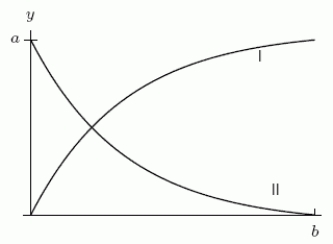


Unlock Deck
Unlock for access to all 68 flashcards in this deck.
Unlock Deck
k this deck
25
The density function for the height of trees in a forest is given by  , where x is height in meters and the tallest tree is 10 meters. Find the cumulative distribution function,
, where x is height in meters and the tallest tree is 10 meters. Find the cumulative distribution function,  , for this density function.
, for this density function.
 , where x is height in meters and the tallest tree is 10 meters. Find the cumulative distribution function,
, where x is height in meters and the tallest tree is 10 meters. Find the cumulative distribution function,  , for this density function.
, for this density function.
Unlock Deck
Unlock for access to all 68 flashcards in this deck.
Unlock Deck
k this deck
26
The graph of a probability density function is given. Sketch a graph of the cumulative distribution function. 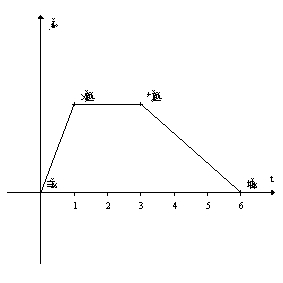


Unlock Deck
Unlock for access to all 68 flashcards in this deck.
Unlock Deck
k this deck
27
Let  be the cumulative distribution function for the number of credits taken by students at a community college. Some values of
be the cumulative distribution function for the number of credits taken by students at a community college. Some values of  are shown in the following table. What fraction of the students took between 12 and 18 credits?
are shown in the following table. What fraction of the students took between 12 and 18 credits? 
 be the cumulative distribution function for the number of credits taken by students at a community college. Some values of
be the cumulative distribution function for the number of credits taken by students at a community college. Some values of  are shown in the following table. What fraction of the students took between 12 and 18 credits?
are shown in the following table. What fraction of the students took between 12 and 18 credits? 

Unlock Deck
Unlock for access to all 68 flashcards in this deck.
Unlock Deck
k this deck
28
The following figure shows a density function and the corresponding distribution function. The drawing is not to scale. What is a reasonable estimate for b? 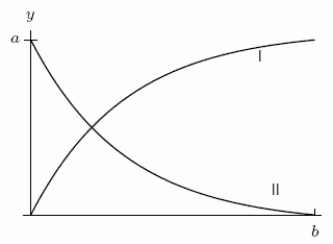
A)1
B)2
C)3
D)4
E)cannot be determined

A)1
B)2
C)3
D)4
E)cannot be determined

Unlock Deck
Unlock for access to all 68 flashcards in this deck.
Unlock Deck
k this deck
29
The life expectancy of a bug can be approximated by the density function  , where t is time in days. Find the probability that a bug lives between 3 and 5 days. Round to 2 decimal places.
, where t is time in days. Find the probability that a bug lives between 3 and 5 days. Round to 2 decimal places.
 , where t is time in days. Find the probability that a bug lives between 3 and 5 days. Round to 2 decimal places.
, where t is time in days. Find the probability that a bug lives between 3 and 5 days. Round to 2 decimal places.
Unlock Deck
Unlock for access to all 68 flashcards in this deck.
Unlock Deck
k this deck
30
The density function for the height of trees in a forest is given by  , where x is height in meters and the tallest tree is 10 meters. Find the probability, to 3 decimal places, that a tree is between 5 and 8 meters tall.
, where x is height in meters and the tallest tree is 10 meters. Find the probability, to 3 decimal places, that a tree is between 5 and 8 meters tall.
 , where x is height in meters and the tallest tree is 10 meters. Find the probability, to 3 decimal places, that a tree is between 5 and 8 meters tall.
, where x is height in meters and the tallest tree is 10 meters. Find the probability, to 3 decimal places, that a tree is between 5 and 8 meters tall.
Unlock Deck
Unlock for access to all 68 flashcards in this deck.
Unlock Deck
k this deck
31
The following figure shows a density function and the corresponding distribution function. What is the value of a? 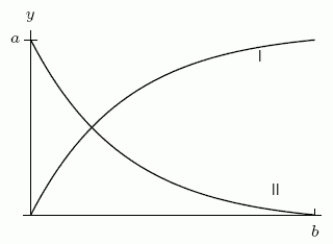


Unlock Deck
Unlock for access to all 68 flashcards in this deck.
Unlock Deck
k this deck
32
The probability of waiting no more than m minutes for a taxi on a certain street corner is
P( ) =
) =  .
.
Find the median waiting time to 3 decimal places.
P(
 ) =
) =  .
.Find the median waiting time to 3 decimal places.

Unlock Deck
Unlock for access to all 68 flashcards in this deck.
Unlock Deck
k this deck
33
Which of the following could possibly be cumulative distribution functions? Select all that apply.
A) for
for 
B) for
for 
C) for
for 
A)
 for
for 
B)
 for
for 
C)
 for
for 

Unlock Deck
Unlock for access to all 68 flashcards in this deck.
Unlock Deck
k this deck
34
Let p(t) be a probability density which is defined for 0 t 1. Could the following be the cumulative distribution function for p? 


Unlock Deck
Unlock for access to all 68 flashcards in this deck.
Unlock Deck
k this deck
35
The heights, in inches, of flowers in a garden have the density function shown in the following figure. How many inches tall is the tallest flower? 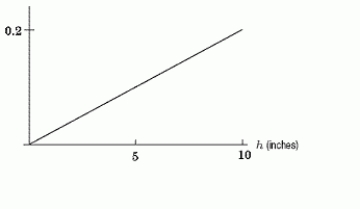


Unlock Deck
Unlock for access to all 68 flashcards in this deck.
Unlock Deck
k this deck
36
Let  be the cumulative distribution function for the number of credits taken by students at a community college. Some values of
be the cumulative distribution function for the number of credits taken by students at a community college. Some values of  are shown in the following table. What was the median number of credit hours taken by the students?
are shown in the following table. What was the median number of credit hours taken by the students? 
 be the cumulative distribution function for the number of credits taken by students at a community college. Some values of
be the cumulative distribution function for the number of credits taken by students at a community college. Some values of  are shown in the following table. What was the median number of credit hours taken by the students?
are shown in the following table. What was the median number of credit hours taken by the students? 

Unlock Deck
Unlock for access to all 68 flashcards in this deck.
Unlock Deck
k this deck
37
Which of the following cumulative distribution graphs would most likely represent the total annual sales of milk?
I.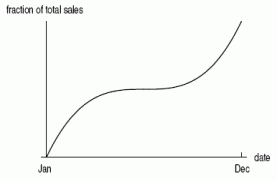 II.
II. 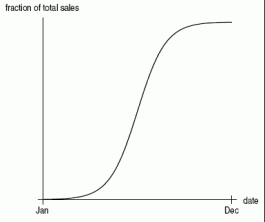 III.
III. 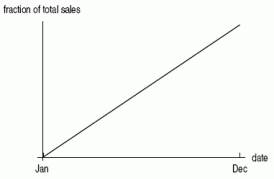
I.
 II.
II.  III.
III. 

Unlock Deck
Unlock for access to all 68 flashcards in this deck.
Unlock Deck
k this deck
38
The cumulative distribution function for the time to complete a step on an assembly line is given in the following table. What percent of the steps take from 0 to 14 minutes to complete? 


Unlock Deck
Unlock for access to all 68 flashcards in this deck.
Unlock Deck
k this deck
39
The heights, in inches, of flowers in a garden have the density function shown in the following figure. The median height is 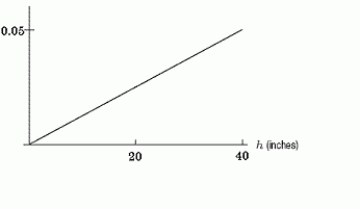
A)less than 20 inches.
B)equal to 20 inches.
C)greater than 20 inches.

A)less than 20 inches.
B)equal to 20 inches.
C)greater than 20 inches.

Unlock Deck
Unlock for access to all 68 flashcards in this deck.
Unlock Deck
k this deck
40
The life expectancy of a bug can be approximated by the density function  , where t is time in days. Find the cumulative distribution function,
, where t is time in days. Find the cumulative distribution function,  , associated with this density function.
, associated with this density function.
 , where t is time in days. Find the cumulative distribution function,
, where t is time in days. Find the cumulative distribution function,  , associated with this density function.
, associated with this density function.
Unlock Deck
Unlock for access to all 68 flashcards in this deck.
Unlock Deck
k this deck
41
The density function for lunch time taken by a group of office workers is given by  . The maximum allowable lunch time is 1 hour, so we have
. The maximum allowable lunch time is 1 hour, so we have  .
.
A. Find the median number of hours taken, to 2 decimal places.
B. Find the mean number of hours taken, to 2 decimal places.
 . The maximum allowable lunch time is 1 hour, so we have
. The maximum allowable lunch time is 1 hour, so we have  .
.A. Find the median number of hours taken, to 2 decimal places.
B. Find the mean number of hours taken, to 2 decimal places.

Unlock Deck
Unlock for access to all 68 flashcards in this deck.
Unlock Deck
k this deck
42
The annual rainfall for a desert city is approximately normally distributed with mean 4 and standard deviation 1. Which of the following is the density function for annual rainfall?
A)
B)
C)
D)
A)

B)

C)

D)


Unlock Deck
Unlock for access to all 68 flashcards in this deck.
Unlock Deck
k this deck
43
According to data from 2007, the height of five-year-old girls is normally distributed with a mean of 42 inches and a standard deviation of 1.5 inches. Use your calculator or computer to find the percentage of 5-year-old girls between 43 and 44 inches.
A)25
B)22
C)12
D)83
A)25
B)22
C)12
D)83

Unlock Deck
Unlock for access to all 68 flashcards in this deck.
Unlock Deck
k this deck
44
A density function is given by  for
for  . Estimate the median of the distribution.
. Estimate the median of the distribution.
A)1.16
B)1.54
C)1.02
D)1.78
 for
for  . Estimate the median of the distribution.
. Estimate the median of the distribution.A)1.16
B)1.54
C)1.02
D)1.78

Unlock Deck
Unlock for access to all 68 flashcards in this deck.
Unlock Deck
k this deck
45
The density function for the shelf life, in days, of a product in a grocery store is shown in the graph. 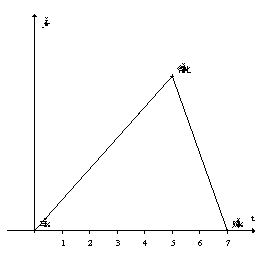 Estimate the median shelf life of the product.
Estimate the median shelf life of the product.
A)2.25 days
B)3.25 days
C)4.25 days
D)5.25 days
 Estimate the median shelf life of the product.
Estimate the median shelf life of the product.A)2.25 days
B)3.25 days
C)4.25 days
D)5.25 days

Unlock Deck
Unlock for access to all 68 flashcards in this deck.
Unlock Deck
k this deck
46
In the following probability density function, is the mean smaller or greater than the median? 


Unlock Deck
Unlock for access to all 68 flashcards in this deck.
Unlock Deck
k this deck
47
Suppose scores from a standardized test measure from 0 to 100. If most scores were in the middle (with few extremely high or low scores), pick the graph that best represents the cumulative distribution function. 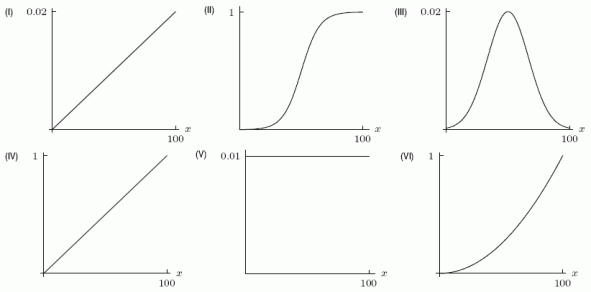


Unlock Deck
Unlock for access to all 68 flashcards in this deck.
Unlock Deck
k this deck
48
Which of the following functions makes the most sense as a model for the probability density function representing a random value chosen between 0 and 1?
A) for
for 
B) for
for 
C) for
for 
A)
 for
for 
B)
 for
for 
C)
 for
for 

Unlock Deck
Unlock for access to all 68 flashcards in this deck.
Unlock Deck
k this deck
49
According to data from 2007, the height of five-year-old girls is normally distributed with a mean of 42 inches and a standard deviation of 1.5 inches. Write the formula for the density function for height of five-year-old girls.

Unlock Deck
Unlock for access to all 68 flashcards in this deck.
Unlock Deck
k this deck
50
The following figure shows the distribution of the number of hours of television viewed per day by a group of children. Estimate the percent of the children who watched less than 3 hours per day. 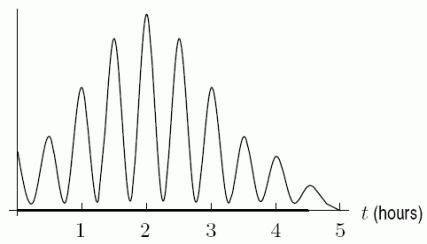
A)65%
B)95%
C)50%
D)80%

A)65%
B)95%
C)50%
D)80%

Unlock Deck
Unlock for access to all 68 flashcards in this deck.
Unlock Deck
k this deck
51
A banana plant typically has about 40 leaves that emerge over a period of 238 days (8 months). Younger leaves emerge more rapidly than later leaves. If you randomly select a banana leaf, the probability density function for the month of emergence is given by  . Use a calculator or computer to find the median time of emergence.
. Use a calculator or computer to find the median time of emergence.
A)2.7 months
B)2.4 months
C)3.3 months
D)4.0 months
 . Use a calculator or computer to find the median time of emergence.
. Use a calculator or computer to find the median time of emergence.A)2.7 months
B)2.4 months
C)3.3 months
D)4.0 months

Unlock Deck
Unlock for access to all 68 flashcards in this deck.
Unlock Deck
k this deck
52
The final exam scores for a calculus course were approximately normally distributed with mean  and standard deviation
and standard deviation  . The maximum possible score was 100. What is the probability that a randomly selected student received an A grade (90 or higher)? Round to 3 decimal places.
. The maximum possible score was 100. What is the probability that a randomly selected student received an A grade (90 or higher)? Round to 3 decimal places.
 and standard deviation
and standard deviation  . The maximum possible score was 100. What is the probability that a randomly selected student received an A grade (90 or higher)? Round to 3 decimal places.
. The maximum possible score was 100. What is the probability that a randomly selected student received an A grade (90 or higher)? Round to 3 decimal places.
Unlock Deck
Unlock for access to all 68 flashcards in this deck.
Unlock Deck
k this deck
53
The annual rainfall for a desert city is approximately normally distributed with mean 7 and standard deviation 1. What is the probability that the annual rainfall will be between 6 and 8 inches? Round to 2 decimal places.

Unlock Deck
Unlock for access to all 68 flashcards in this deck.
Unlock Deck
k this deck
54
The lifespan of a bug is approximately normally distributed with mean  days and standard deviation
days and standard deviation  days. Assume a maximum possible lifespan of 3 weeks. What is the probability of a randomly selected bug living less than a week? Round to 2 decimal places.
days. Assume a maximum possible lifespan of 3 weeks. What is the probability of a randomly selected bug living less than a week? Round to 2 decimal places.
 days and standard deviation
days and standard deviation  days. Assume a maximum possible lifespan of 3 weeks. What is the probability of a randomly selected bug living less than a week? Round to 2 decimal places.
days. Assume a maximum possible lifespan of 3 weeks. What is the probability of a randomly selected bug living less than a week? Round to 2 decimal places.
Unlock Deck
Unlock for access to all 68 flashcards in this deck.
Unlock Deck
k this deck
55
Each of the following density functions represents the heights of a group of people in a community. Which one most likely represents the heights of a group consisting of only the children in the community?
I.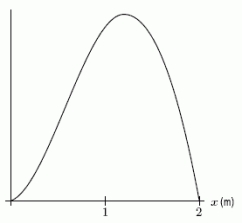 II.
II. 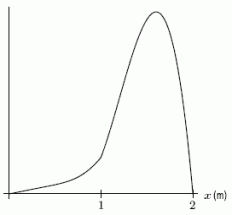 III.
III. 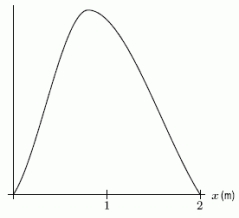
I.
 II.
II.  III.
III. 

Unlock Deck
Unlock for access to all 68 flashcards in this deck.
Unlock Deck
k this deck
56
Using the following figure, calculate the value of c if p is a density function. 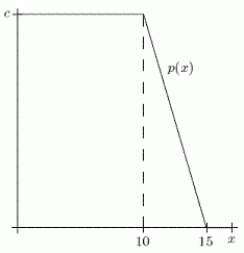


Unlock Deck
Unlock for access to all 68 flashcards in this deck.
Unlock Deck
k this deck
57
The probability of a plant surviving t days without water is given by  for some constant c. If the probability of the plant surviving 6 days without water is 0.8, what is c? Round to 2 decimal places.
for some constant c. If the probability of the plant surviving 6 days without water is 0.8, what is c? Round to 2 decimal places.
 for some constant c. If the probability of the plant surviving 6 days without water is 0.8, what is c? Round to 2 decimal places.
for some constant c. If the probability of the plant surviving 6 days without water is 0.8, what is c? Round to 2 decimal places.
Unlock Deck
Unlock for access to all 68 flashcards in this deck.
Unlock Deck
k this deck
58
The density function for the time to complete a certain task is approximately equal to  , where t is time in minutes and
, where t is time in minutes and  .
.
A. Find the median number of minutes taken, to 2 decimal places.
B. Find the mean number of minutes taken, to 2 decimal places.
 , where t is time in minutes and
, where t is time in minutes and  .
.A. Find the median number of minutes taken, to 2 decimal places.
B. Find the mean number of minutes taken, to 2 decimal places.

Unlock Deck
Unlock for access to all 68 flashcards in this deck.
Unlock Deck
k this deck
59
A professor far away from here gives the same 100-point final exam year after year and discovers that the students' scores tend to follow the triangular probability density function f(x) pictured below:  Do the mean and the median both describe the same point on this probability density function?
Do the mean and the median both describe the same point on this probability density function?
 Do the mean and the median both describe the same point on this probability density function?
Do the mean and the median both describe the same point on this probability density function?
Unlock Deck
Unlock for access to all 68 flashcards in this deck.
Unlock Deck
k this deck
60
Suppose that the distribution of people's ages in the United States is essentially constant, or uniform, from age 0 to age 60, and from there it decreases linearly until age 100. This distribution p(x) is shown below, where x is age in years, and p measures probability density. Such a probability distribution is called trapezoidal. 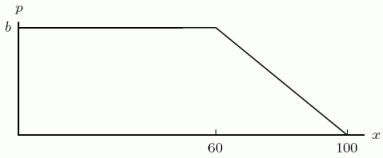 Find the median age of the United States population.
Find the median age of the United States population.
 Find the median age of the United States population.
Find the median age of the United States population.
Unlock Deck
Unlock for access to all 68 flashcards in this deck.
Unlock Deck
k this deck
61
Which of the following distributions best describe the density function for annual popcorn sales by a Cub Scout pack if the sales are approximately normally distributed and they almost always make between $300 and $500?
A)
B)
C)
D)
A)

B)

C)

D)


Unlock Deck
Unlock for access to all 68 flashcards in this deck.
Unlock Deck
k this deck
62
Let  be the density function for call-back time by an answering service with t = time in minutes and
be the density function for call-back time by an answering service with t = time in minutes and  . Find the mean, in minutes, to 2 decimal places.
. Find the mean, in minutes, to 2 decimal places.
 be the density function for call-back time by an answering service with t = time in minutes and
be the density function for call-back time by an answering service with t = time in minutes and  . Find the mean, in minutes, to 2 decimal places.
. Find the mean, in minutes, to 2 decimal places.
Unlock Deck
Unlock for access to all 68 flashcards in this deck.
Unlock Deck
k this deck
63
The number of hours of sleep per night averaged by a group of students is approximately normally distributed with mean  and standard deviation
and standard deviation  . What is the probability that a student selected at random had more than 7.5 hours of sleep? Round to 2 decimal places.
. What is the probability that a student selected at random had more than 7.5 hours of sleep? Round to 2 decimal places.
 and standard deviation
and standard deviation  . What is the probability that a student selected at random had more than 7.5 hours of sleep? Round to 2 decimal places.
. What is the probability that a student selected at random had more than 7.5 hours of sleep? Round to 2 decimal places.
Unlock Deck
Unlock for access to all 68 flashcards in this deck.
Unlock Deck
k this deck
64
The race times for a group of cross-country runners are all between 15 and 25 minutes. They are represented by the density function  and the corresponding cumulative distribution function
and the corresponding cumulative distribution function  , where t is time in minutes. Express
, where t is time in minutes. Express  in terms of
in terms of  .
.
 and the corresponding cumulative distribution function
and the corresponding cumulative distribution function  , where t is time in minutes. Express
, where t is time in minutes. Express  in terms of
in terms of  .
.
Unlock Deck
Unlock for access to all 68 flashcards in this deck.
Unlock Deck
k this deck
65
The speed of cars on a freeway are approximately normally distributed with mean  mph and standard deviation
mph and standard deviation  mph. Assume a maximum speed of 100 mph. What percent of cars are going between 65 and 70 mph? Round to the nearest percent.
mph. Assume a maximum speed of 100 mph. What percent of cars are going between 65 and 70 mph? Round to the nearest percent.
 mph and standard deviation
mph and standard deviation  mph. Assume a maximum speed of 100 mph. What percent of cars are going between 65 and 70 mph? Round to the nearest percent.
mph. Assume a maximum speed of 100 mph. What percent of cars are going between 65 and 70 mph? Round to the nearest percent.
Unlock Deck
Unlock for access to all 68 flashcards in this deck.
Unlock Deck
k this deck
66
The density function and the cumulative distribution function for the ages of people in an elementary school are graphed below. Which figure is the cumulative distribution function?
I.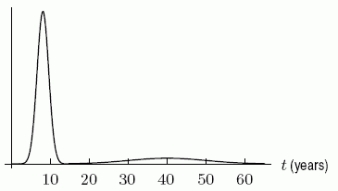 II.
II. 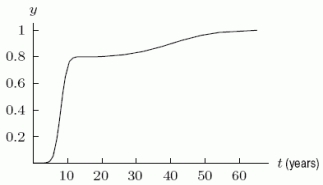
I.
 II.
II. 

Unlock Deck
Unlock for access to all 68 flashcards in this deck.
Unlock Deck
k this deck
67
The speed of cars on a freeway are approximately normally distributed with mean  mph and standard deviation
mph and standard deviation  mph. Assume a maximum speed of 100 mph. If speeding tickets are given to cars traveling faster than 82 mph, what is the probability that a randomly selected car is going fast enough to get a ticket? Round to 2 decimal places.
mph. Assume a maximum speed of 100 mph. If speeding tickets are given to cars traveling faster than 82 mph, what is the probability that a randomly selected car is going fast enough to get a ticket? Round to 2 decimal places.
 mph and standard deviation
mph and standard deviation  mph. Assume a maximum speed of 100 mph. If speeding tickets are given to cars traveling faster than 82 mph, what is the probability that a randomly selected car is going fast enough to get a ticket? Round to 2 decimal places.
mph. Assume a maximum speed of 100 mph. If speeding tickets are given to cars traveling faster than 82 mph, what is the probability that a randomly selected car is going fast enough to get a ticket? Round to 2 decimal places.
Unlock Deck
Unlock for access to all 68 flashcards in this deck.
Unlock Deck
k this deck
68
The density function and the cumulative distribution function for the ages of people in an elementary school are graphed below. About what percent of the people in the school are adults? I. 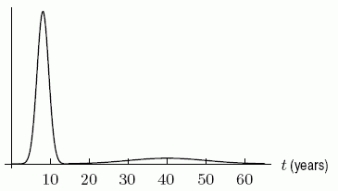 II.
II. 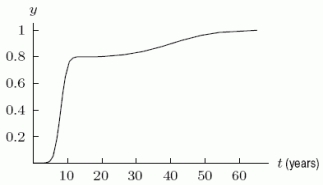
A)20%
B)40%
C)60%
D)80%
 II.
II. 
A)20%
B)40%
C)60%
D)80%

Unlock Deck
Unlock for access to all 68 flashcards in this deck.
Unlock Deck
k this deck


